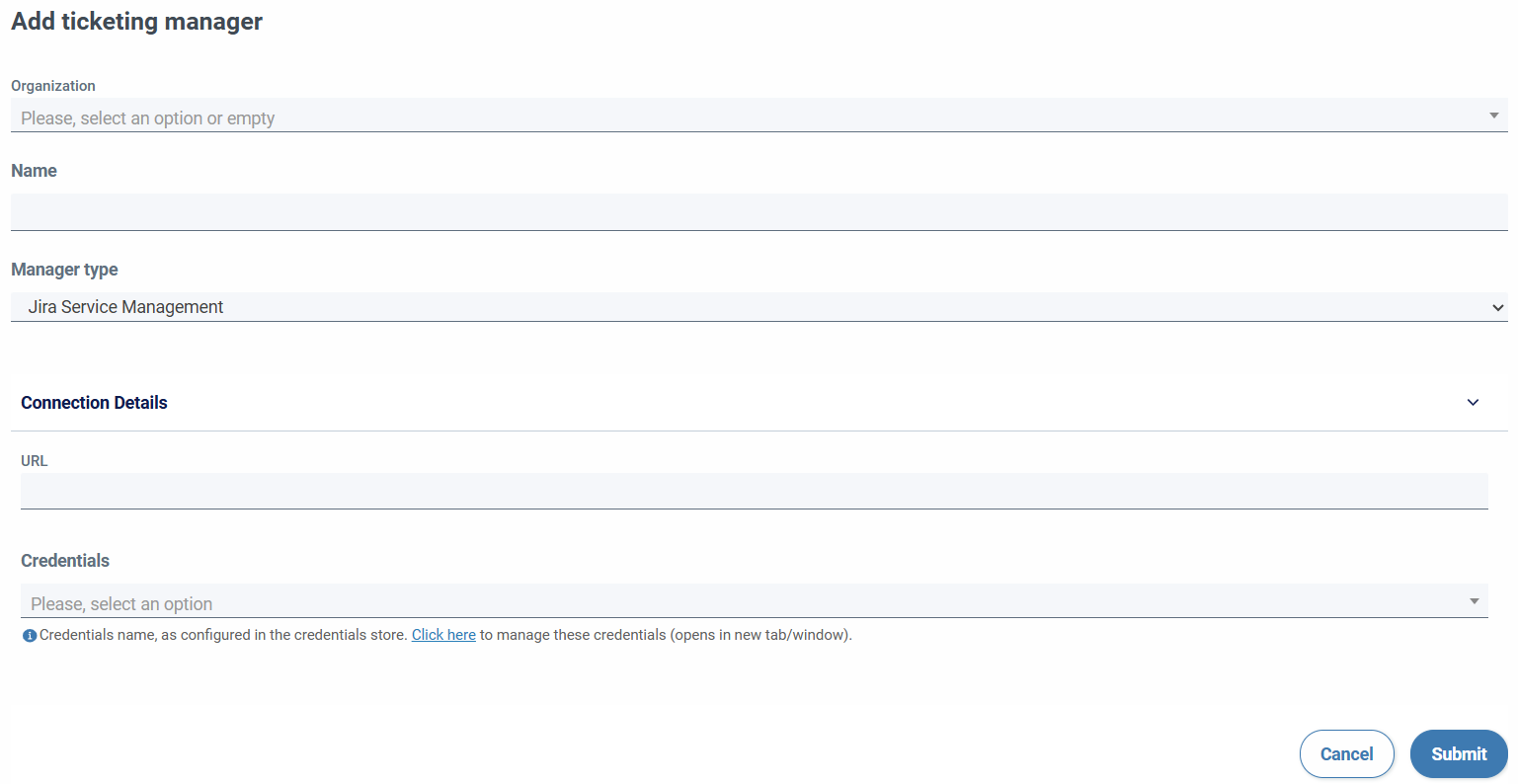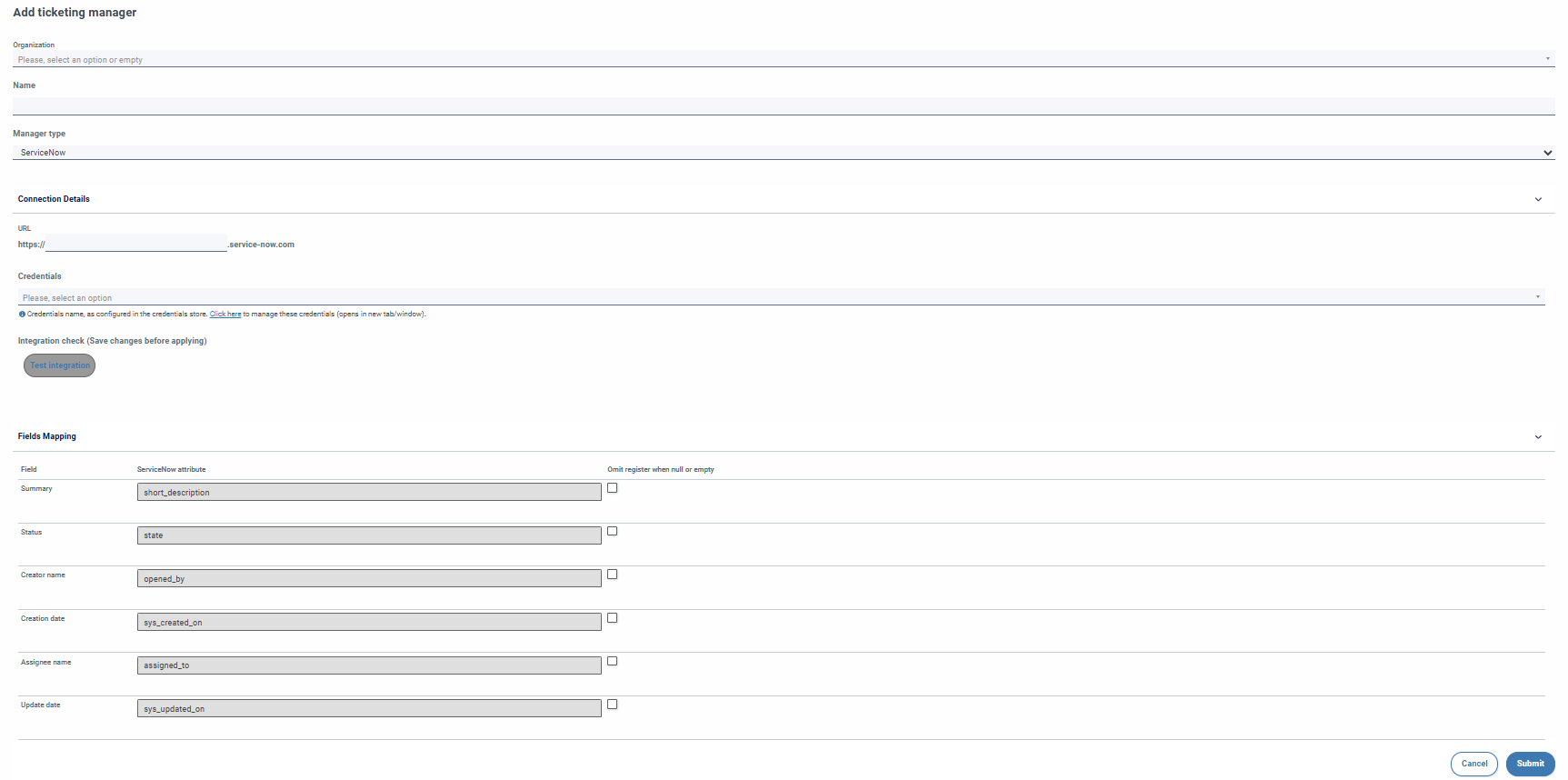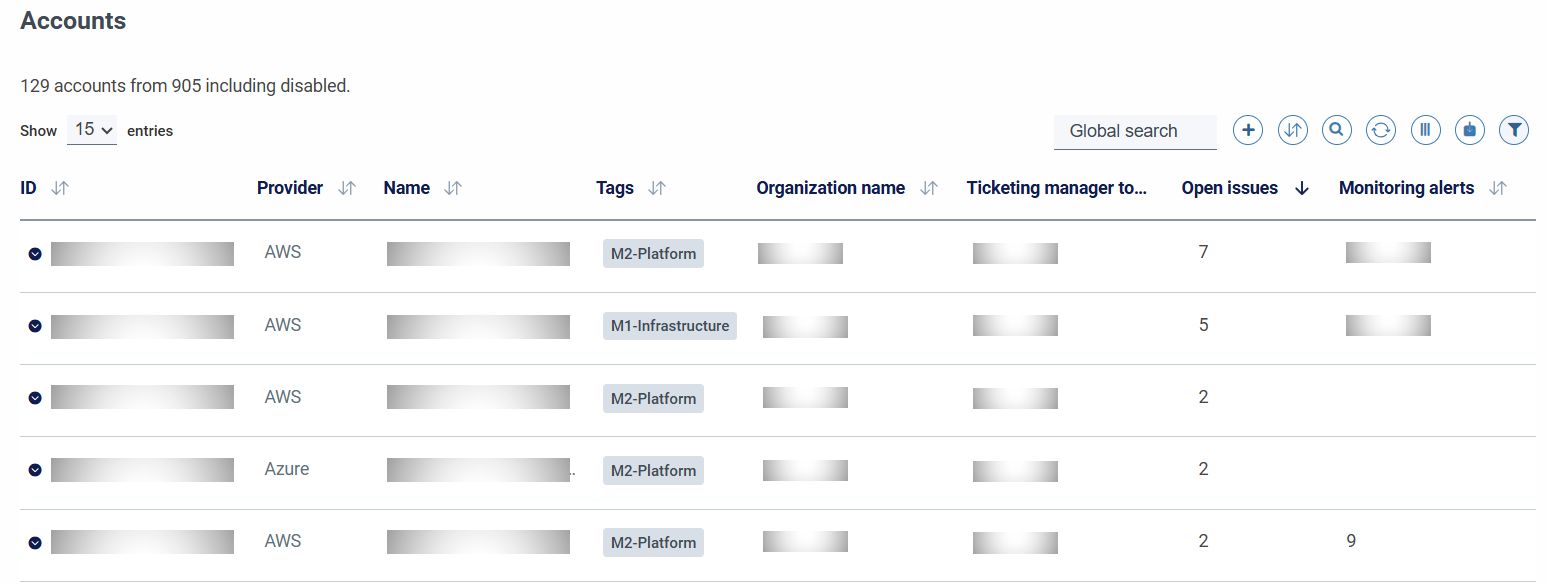Issue managers
Issue managers¶
SSMCM allows you to display the tickets associated with a project in an external ticketing manager. To do this, you must first configure the project manager, and then associate it with the accounts that use that project.
Issue managers supported
For now, the only ticketing managers supported are the following:

Manager type: Jira Service Management
When adding/editing a manager, the following fields must be filled:
- Organization (required)
- Name (required. Unique per organization)
- Jira Service Management manager type (non-editable)
- URL of the manager (required, must be the full url)
- Credentials (required)

Once the manager has registered, it is necessary to configure the accounts to use it; To do this, we must go to the accounts section, edit the corresponding account, and select the ticketing manager, indicate the corresponding project of the account in the ticketing manager, and, optionally, the credentials that you will use if they have not been defined some in the manager, or you want to use others.
When associating a ticketing manager to an account, the ticketing managers of the organization that owns the account and those of the MSP organizations can be associated with those delegated responsibilities (administration and operations on infrastructure), in the event that this delegation of responsibilities had been specified.

Project field format¶
For greater versatility when obtaining the tickets associated with an account or an inventory item, the following format has been defined for the configuration of the projects of an account. The project field should be a JSON document, as simple as this:
{
"project1": {}
}
Or as comprehensive as this:
{
"project1": {
"include_statuses": ["Pending", "In progress"],
"exclude_statuses": ["Closed", "Canceled"],
"pre_jql": "my_pre_jql",
"post_jql": "my_post_jql",
"jql": "xxx",
"custom_fields": {
"Field 1": "Custom value",
"External project": ["Project 1", "Project 2"],
}
},
"project2": {
"xxx": "yyy"
}
}
Only for the Jira manager type, from this configuration, a Jira JQL filter will be generated:
- If the field is defined
jql, all other fields will be used, and the remaining fields will be ignored. - A filter of type
project = project1 - If the field is specified
pre_jql, is added to the start of the generated JQL filter. - If the field is specified
post_jql, is added to the end of the generated JQL filter. - If the field is specified
include_statuses, an expression of typeAND status in status1, status2, .... - If the field is specified
exclude_statuses, an expression of typeAND status not in status1, status2, .... - If no field is specified
include_statusesnorexclude_statuses, A default expression is added:AND resolution is Unresolved. - For each of the custom fields in
custom_fields, if specified, another expression is added at the end; Custom field values can be simple text strings, or lists. The filter to be added would be of the typeand "Field 1" = "Custom value" and "External project" in ("Project 1","Project 2").
Manager of type: ServiceNow
When adding/editing a manager, the following fields must be filled:
- Organization (required)
- Name (required. Unique per organization)
- ServiceNow manager type (non-editable)
- Manager URL (subdomain only, non-editable)
- Credentials (required, non-editable)
- Mapping of fields with constant values and corresponding checks for treatment in case of null

A button will be presented to check the integration. This will remain disabled if the creation failed or has been modified some value of the form and that change has not been saved.
In order for SSMCM to connect to the ticketing manager and obtain the information, credentials must be specified, that must be preconfigured on the key storage system used by SSMCM. These credentials can be specified at 2 levels: at the ticketing manager level, or at the account level, depending on the project-level or manager-level permissions granted to the credential.
Once the manager is created, it can be linked to an account.

Once the manager is assigned to the account, columns are available to display information from the manager of each account:
Integration with ServiceNow is only available for items: AWS EC2, AWS RDS, and AWS S3. To extend this integration To other elements you can contact support@meikai.cloud.
Viewing in accounts
Information about ticketing managers (number of tickets associated with an account, and associated with an inventory item) is updated every 30 minutes.

Using credentials¶
It is possible to specify credentials at both ticketing manager and account level. Credentials must be specified in at least one of the two places. If credentials are specified in the account, these will be used to connect to the ticketing manager and collect the tickets; if not, and have Once you specify credentials at the administrator level, those will then be used. If no credentials have been defined in None of the 2, a validation error will be thrown.
This allows you to have ticketing managers that use the same credentials for all accounts that are associated, or to have different credentials per account for the same manager, for example, with different or specific permissions for the account.
When specifying account-level credentials, only those corresponding to the organization that owns the account, even if the associated ticketing manager belongs to an MSP organization to which some responsibility has been delegated (administration and/or operations on infrastructure)
Synchronization¶
The number of tickets opened to each account are updated every 30 minutes.